To the Artist Work Is Not an Obstacle, but a Gift
Artists have about fifty qualities that fit perfectly together to make them best suited to be artists rather than engaging in other occupations. One of those qualities is their love of and attachment to work. The majority of people do not like to work, consider work a burden, and would rather not work, but seek leisure and rest. But most writers, painters, actors, and ballet dancers who will become known vary from that norm.
Creative people do not avoid work, but absorb themselves in it, even though the work of a recognizably accomplished artist is difficult, extremely hard to master, and taxing. What drives them to the easel or keyboard every possible day is the joy of working and a desire for creative fulfillment, a special state of being that lies at the far end of hard work that evades most people.
In The Creative Process Brewster Ghiselin states that artists and thinkers create the structure of their mental lives by means of their works. C. G. Jung said, “The work in process becomes the poet’s fate.” The work–the painting, novel, or musical composition–must be finished [half-finished doesn’t count] if the artist is to be satisfied because “it is only as the creative work is done that the meaning of the creative effort can appear and the development of the artist brought about by it is attained.”
William Faulkner, author of thirteen novels and scores of short stories, said that “the only thing a man can do for eight hours a day is work. He can’t eat for eight hours; he can’t drink for eight hours; he can’t make love for eight hours. The only thing a man can do for eight hours is work. ” To the artist work isn’t an obstacle, but a gift, a challenge not to be avoided, but to be embraced happily.
Faulkner’s secret was to stop looking at the clock. He wrote, “Clocks slay time… time is dead as long as it is being clicked off by little wheels; only when the clock stops does time come to life.” Staring at the clock never gets the artist’s work done.
Vincent van Gogh talks about the agonies artists feel when they are unable to perform artists’ work, his feelings then of being imprisoned in “an …utterly horrible, horrible cage.” Work is so essential to artists’ sense of wholeness that not being able to work at an artist’s role in van Gogh’s judgment reduces artists to a state of “nothingness” and uselessness.
When men and women commit to a serious artist’s life they introduce into their existence the most demanding effort and emotional upheavals generally they will have ever known. They might have been stevedore longshoremen on the docks of New York, but will never know days of exhaustion like this: “Work every day till your [sic] so pooped about all the exercise you can face is reading the papers” (Ernest Hemingway). Poet Emily Dickinson said that if she felt physically as if the top of her head was taken off, she knew that was poetry
Artists begin each day with the goal of working hard. I have been laid up with bad colds for weeks, unable to work, and it has been frustrating and truly painful for me when all I want is to get back to writing my book.
Artists are almost always bent on working hard: “Work is the law. Like iron that lying idle degenerates into a mass of useless rust, like water that in an unruffled pool sickens stagnates into a stagnant and corrupt state, so without action the spirit of men turns to a dead thing, loses its force, ceases prompting us to leave some trace of ourselves on this earth” (Leonardo da Vinci).
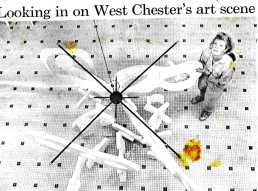
Photographed during the installation of three 18ft hanging mobiles commissioned for an architects building in Pa. USA Janet Weight Reed
Even striving to sew together an artist’s life is daunting: “The sheer labor of preparing technically for creative work, consciously acquiring the requisite knowledge of medium and skill in its use is extensive and arduous enough to repel many from achievement” (Brewster Ghiselin). “From the hard work of men are born…the fidelity to right practice which makes great craftsmen…[and] the devotion to a calling” (Joseph Conrad).
Every serious writer can identify with Flaubert’s “I have written no more than 25 pages in all in six weeks…I have gone over them so much, recopied them, changed them, handled them, that for the time being I can’t make head or tail of them.”
To persist like that takes drive and commitment that’s extraordinary. While you might be able to do that because you’re a writer and you know what’s needed, almost no one you know, from your brother-in-law to your auto mechanic, can imagine doing it voluntarily because they’re not artists–those individuals who think nothing of it.
The “Big Two” of Focus and Energy Lead to Artistic Success
Artists are exceptionally complex thinking and feeling beings who by the grace of nature possess the two main qualities leading to success whatever the field: intense focus and accompanying extraordinary quantities of physical and spiritual energy–Focus and Energy.
Many of the greatest artists and writers have an overpowering urge to produce specific works and have labored astronomically long hours for many years, frequently with no vacations to speak of because there was nothing they would rather do than their work—an unheard of 60 hours, 70 hours, 80 hours every week.
Twentieth century inventor and visionary Buckminster Fuller worked in a frenzy, concluding his work days only when overwhelmed by exhaustion. Honore de Balzac wrote fifteen hours a day for twenty years, and to fuel his energy was in the habit of drinking at least fifty cups of strong coffee every day—so much so that coffee poisoning was one of the causes of his death. Focus and energy are why artists can produce tremendous amounts of work, often four, six, ten times what less focused and energetic people produce.
Poet John Milton said that some people “scorn delights for more laborious lives” and asked, “What hath night to do with sleep?” The tremendous number of hours high achieving writers, sculptors, and ballet dancers are able to work may account for their ability to produce work after work at breakneck speed.
Another reason for such speed is because after a certain number of years of constant practice, producing works becomes automatic for artists. All the skills they need are intact and functioning at extremely high levels, and inspiration comes to them spontaneously and involuntarily immediately and without strain, like wine flowing out of a cask, when they sit down to type at their computer or stand facing an easel with brush in hand,
The pace you work at is as individual as DNA. John Irving says, “I write all my drafts by hand. It’s the right speed for me—slow.” Erle Stanley Gardner was different. He once worked on seven novels simultaneously, dictating 10,000 words in a day, and was the world’s fastest writer. And he was also a lawyer.
Why is it that producing a creative work is often so much more painful than the envious non-creator can imagine? French novelist Gustave Flaubert wrote a friend, “You have no notion what it is to sit out an entire day with your head between your hands beating your unfortunate brains for a word.”
At times the novelist, essayist, poet, or dramatist writes night and day, then executes revision upon revision. Kurt Vonnegut said that writing allows even a stupid person to seem halfway intelligent if only they write the same thought over and over again, improving it just a little each time. Although writing is sometimes grueling, tedious, boring, and very difficult, few other things matter as much to writers.
The act of producing art–so liberating to the artist–may also involve emotional suffering. Julian Green wrote, “if only people knew what lies at the heart of my novels. What a tumult of desires these carefully written pages conceal! I sometimes have a loathing for the furious cravings that give me no peace except when I am writing.”
If you are to succeed in a noteworthy way as an artist you must have the ability to focus intensely for extended periods of time. Creative people often learn at an early age that they will achieve more if they focus their efforts on one area rather than dividing them among a variety of pursuits. They may not be good at math, may not care for games, may never go dancing. As a child all Pablo Picasso wanted was to draw or paint and was such extremely poor student in every other subject that people thought him stupid.
The Most Distinguishing Quality of Creatives
Persistent and enthusiastic absorption in their work is the most distinguishing quality of creatives in spite of Flaubert’s and Green’s kind of suffering, or your own very real suffering. Creative talent is indistinguishable from passion and intensity. You can hardly call yourself creative if you lack them.
One reason writers and painters who are experts are more accomplished than writers and painters who are very good but not experts is that experts are more passionate about their work and spend more hours at it. The only way you could keep some artists from writing or painting would be to dislocate their fingers. Even before their fingers were fully mended, the artists would be back at work.
What makes writers and painters, actors and composers so persistent? It is their thrilling, hard-to-contain joy in the act of creation itself: “It is worth mentioning, for future reference, that the creative power which bubbles so pleasantly in beginning [of a new work] quiets down after a time, and one goes on more steadily. Doubts creep in. Then one becomes resigned. Determination not to give in, and the sense of an impending shape keep one at it more than anything” (Virginia Woolf).
Flow
When they are creating, artists are capable of losing all sense of time and place, conscious only of the work before them. They will let nothing divert them from accomplishing their creative goals, working night and day if need be. Flaubert said that only writing mattered to him, and that he kept all his other passions locked up in a cage, visiting them now and then for diversion.
The artist’s sometimes astonishing work production is aided by flow, a state described by Mihaly Csikszentmihalyi. In flow you’re fully absorbed in the act of writing, painting, acting, composing–more fully absorbed than you have been in anything else. Your concentration and positive emotions are strong and alert, and you know exactly what needs to be done. You put aside personal problems. You lose your sense of being in time and of having a body or a mind. Art comes out of you effortlessly.
You’re relaxed, “psyched,” focused, and yet detached at the same time—in a state of harmony with your surroundings. You’re as confident and feel as competent as you’ll ever be. When artists are in flow they are functioning at their most potent ability.
The main qualities of flow are the following ten:
- Your goals are clear and not muddled. (When you work at your craft, your goals must be so clear that you can state them in a single sentence.)
- There’s unambiguous, immediate feedback on performance so that adjustments can be made. It’s hard to become immersed in your art if you’re not certain about how well you’re doing, what’s feasible and what isn’t, and whether you’re wasting your time or are accomplishing something that’s worth accomplishing.
- Your skills are well-matched with the goal you’re trying to achieve: whatever the skill the art calls for, you possess. You’re very confident that you have every skill you’ll need to reach the goals of the project at hand. To attempt something you lack the skills for will only frustrate you.
- Your concentration is highly focused.
- You’re not worried about failing.
- There’s no sense of “self” separated from the work at hand. You do the work, but don’t think, “I am doing this work.” There is no “I” involved. You are non-attached.
- Your sense of time is distorted. An hour seems like a minute or a minute seems like an hour.
- The activity is so enjoyable in itself that you need no external reward. But pay and other external motivations can also lead to you being in the zone such as when after years of trying unsuccessfully, you have a great financial success and public recognition.
- You don’t feel tiredness.
- You lose your appetite or don’t notice it and you skip meals.
Being In the Groove
Very much like being in flow is being in the groove. In The Creative Habit dancer/choreographer Twyla Tharp talks about “finding your groove.” Grooves can last minutes, hours, or weeks or months, and are usually preceded by a breakthrough idea. What does it feel like when you’re in a groove?
“When you’re in a groove, you’re not spinning your wheels, you’re moving forward in a straight and narrow path without pauses or hitches. You’re unwavering, undeviating, unparalleled in your purpose. A GROOVE IS THE BEST PLACE IN THE WORLD. It’s where I strive to be, because when you’re in it you have the freedom to explore, where everything you question leads you to new avenues and new routes as everything you touch miraculously touches something else and transforms it for the better…And then it’s over…There’s no point in analyzing it. If you could figure out how you get into a groove you could figure out how to maintain it. That’s not going to happen. The best you can hope for is the wisdom and good fortune to occasionally fall into a groove.”
The beautiful paintings included in this post are by one of my favorite artists, Janet Weight Reed. The images shown here are a tiny example of some of the work she has completed during a career which has spanned 45 years.The hummingbird, symbolizing the “unseen magic” of the world is her signature image.
Janet says, “Waking each day filled with anticipation, excitement and sometimes trepidation is I believe one of the many reasons that keeps an artist/creative going. To be in the flow and rhythm of creative work is a wonderful state of being. No matter what else is going on in one’s life a deep sense of fulfilment takes over.”
I won’t ask if you have ever been in flow or in the groove or have known the bliss of creation because if you are an artist working every day with seriousness, living the life of a creator, I know you have, possibly many times.
Instead, I’ll ask, “Were you in the groove today? How did your work go?”
© 2019 David J. Rogers
For my interview from the international teleconference with Ben Dean about Fighting to Win, click on the following link:
Order Fighting to Win: Samurai Techniques for Your Work and Life eBook by David J. Rogers
or
Order Waging Business Warfare: Lessons From the Military Masters in Achieving Competitive Superiority
or

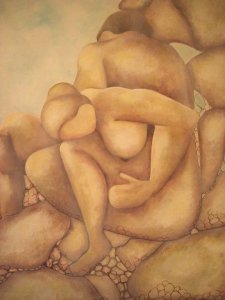
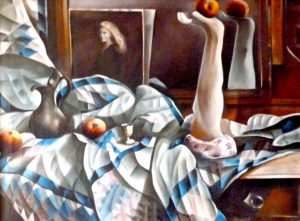
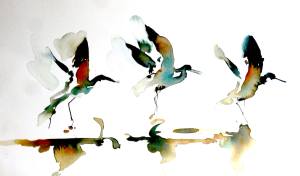
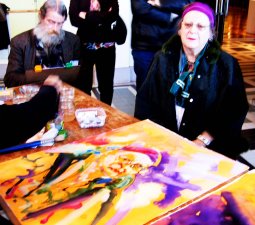
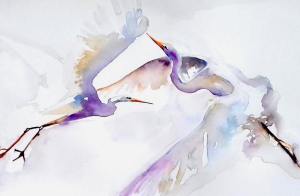
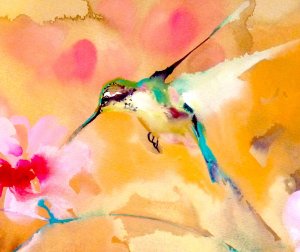


Dear David, I can tell you really warmed to this topic in this rallying piece with its rollicking tempo, almost a call to arms. “You have been given an important job to do, set to and give it everything you have or do note dare to call yourself an artist !” This piece of writing is so intriguing in that it had to be read really fast, the words were flying past my eyes and it was truly an effort to try and make myself read it slowly. But I didn’t need to take in every word and digest it as this piece is about the feeling of flow and losing a sense of time and you demonstrated that brilliantly, David, well done!
LikeLike
Dear Michelle,
Leave it to you to find in my piece subtleties of style and mood. I didn’t realize that it reads fast, but I wrote it fast–one draft with ease and no strain. In my personal essay aimed for publication in magazines and journals I’m trying to fill the texts with an almost visceral energy. It is possible that that is reflected here in this post.
Thank you for your always-original ideas that so stimulate my thinking.
Fondly,
David
LikeLiked by 1 person
Unfortunately I was not in the groove today for anything but I did enjoy reading your post with its beautiful illustrations.
LikeLike
Gallivanta, thank you for your kind comment. I’m sorry you are not in the groove today, but maybe you will be tomorrow. Maybe you will be every day for the next month. Hope so.
LikeLiked by 1 person
Good morning David,
“When men and women commit to a serious artist’s life they introduce into their existence the most demanding effort and emotional upheavals generally they will have ever known”
I have often wondered if I could have seen into the future how my life as a working artist would pan out….would I have continued? I am so glad I didn’t know, because it has been (even with it’s ups and downs and of course feast or famine existence) the most wonderful journey I could ever have imagined.
As I mentioned in a couple of comments, you write so well about the creative psyche and personality. I recognise that you are a superb writer and so understand on a personal level what it is to be a working artist. However, your ability to write about this subject never ceases to amaze and inspire me.
Thank you so much.
Janet 🙂
LikeLiked by 1 person
I’m sure, dear Janet, that with your resources of high intelligence and wonderfully endearing personality, and your energy and drive, that you would have lived a very successful life even if you hadn’t pursued art. But would you have been as fulfilled as you have been through the years, even through times that were so mean and wrenching that you don’t even want to think about them? Possibly not.
In any case it’s to the benefit of us out here–your devoted admirers in the internet’s netherworld–that you chose the life you did so that you could fill it–and ours–with the so lovely products of your beautiful talent and discipline.
You are so kind to me, and I am egotistical enough to be moved by your compliments of me and my writing. All I know is that art and artists have been constantly on my mind since childhood when I realized that the little girl next to me painting could do wonderful things with her hands that I couldn’t because she was exceptionally talented. What is this thing we call talent? Why are some people marked with it, and most people not? How does one get it? How does one develop it? Why is it that talent is often accompanied by the need to express it and show it off? Good questions!
You thank me for my work. I thank you for yours and for the good things you’ve brought into my life.
Best wishes,
David
LikeLiked by 2 people
Thank you very much for this – I can’t tell you how I much I appreciate it. We all have a lot to thank that little girl.
Best wishes to you and do keep warm
Janet
LikeLiked by 1 person
I love this article and found it to be exceptionally motivating. Thank you for the stimulation, David. I am an avid fan of Janet Weight Reed’s work. I love her colors and flow and am in awe at her talent.
LikeLiked by 1 person
Hello, Carol.
Thank you. I’m happy you like my post and that it motivates you. Those stories and quotations motivate me too. To be in the company of Dickinson, Woolf, Faulkner, Da Vinci, and Picasso. What better friends could there be for creatives like us?
My admiration too, for Janet knows no bounds. She is so talented and is such a lovely person. I don’t know exactly how we first came in contact (she says she discovered me first), but our on-line friendship is important to me.
I look forward to learning more about your writing and hope you do more and more of it with energy and focus, enjoying every wonderful minute of work.
Best wishes,
David
LikeLiked by 1 person
Although I have been flowing in and out of poetry most of my life, it took about 10 years of rumination for me to fall into the groove and write my first full length novel in two months. I hope it doesn’t take another 10 years of rumination for the next novel 🧐🦋📚
LikeLike
Hello butterfly. How exciting those two months must have been for you.I too hope the next book comes to you more quickly, but I bet those ten years were time well spent, developing your craft, and that will be reflected in your next book.
Best of luck and thanks for the comment,
David
LikeLike
David, this is such a marvelous and validating article. Well done!
I love that you featured Janet’s work. She is such an inspiration to me.
About being focused on work, and why your words are so validating:
So many times when I talk about the hours I spend writing, formatting, editing, illustrating, and blogging, it’s as if no one (in my “real world” work-world, neighborhood, or friends) is willing to acknowledge it as work, or even worthwhile effort. Just one example, yesterday a neighbor-friend called me to say a large package had been on my porch all afternoon. “Yes, I just brought it in,” I said. “I heard the delivery but just didn’t want to stop what I was writing.”
By her voice, I knew she was blinking bemusement. Others roll their eyes, or snort mild contempt. One even suggested the book wasn’t any good if I was bored by reviewing a chapter for the umpteenth time.
As Ingersoll said, “We rise by lifting others.” This is something you do so very well. As does Janet. My heartfelt thanks to you both. Hugs on the wing.
LikeLike
Dear Teagan,
Thank you for your thoughtful comment.
Your comment gives me a new angle for understanding the subject. I have a hunch right now that I might like to refer to it or quote in in a book I am working on. Would you give me permission to do that?
Hugs to you too, as always, friend,
David
LikeLiked by 1 person
Absolutely — and I’d be honored to be mentioned by you. I’ve seen many writer-bloggers complain that their friends and family give zero support. Like me, they find that validation through other creatives in the blogging community.
Since long-time friends and family, first knew us as something/someone else, they can’t reconcile the “new” writer or artist they suddenly see. Many are oddly threatened by it (us). They didn’t know that aspect when, in their minds, they formed the person long ago.
When I’m feeling less generous, I still think that, but I add that they just don’t want to have to *think* and re-imagine who that person is to them. People, in general, really hate to think…
At any rate, that is the rest of my belief, which began in the other comment.
Wishing you a wonder-filled Lunar New Year. Hugs.
LikeLiked by 1 person
Thank you for your kind permission. What you say about friends, etc., having problems adjusting to a “new” you when you take up writing is strange to me and I’ve never thought about it. I imagine it’s uncomfortable for you.
I’ve always believed that one should allow his or her concept of someone to be open to growth and change in that person. I had my first story published in a magazine when I was seven and then more through the years, and people have always known me as “David the writer.” But it’s an interesting problem. Thank you for telling me about it. I will give it more thought.
Again, thank you for permitting me to use your comment.
Best, David
LikeLiked by 1 person
Now I understand. This is exactly why coworkers confront me and tell me I must slow down, and that I am making the rest of them look bad. It never occurred to me they did not want full immersion in the work. Good thing I am now writing. Wonderful post, David.
LikeLike
JoHawk, thank you for your interestng comment. I know exactly what you mean. Our experiences are similar. I cannot tell you how many times in my student days and work life, I was told, “You work too hard.” When I owned my own company, my employees would tell me that. That implied to me they weren’t working hard enough and thought me abnormal, when the human mind and body are designed to work hard, and working hard should be the most normal thing in the world.
Thanks again.
Best wishes,
David
LikeLiked by 1 person
Yes David, “You work too hard” has been a never-ending refrain. Mother says I am “special” and I have finally decided to embrace it. Who wants to be “normal” anyway?
LikeLiked by 1 person
That’s a very good way of looking at it.
LikeLiked by 1 person
Very interesting post, David. It was wonderful to see what so many writers and artists have said pulled together into one piece. I read it slowly and let the words and images sink in. The illustrations by Janet Weight Reed are exquisite. I’m going to share this with an artist friend of mine living in Belgium.
To answer your question, I haven’t been in the groove today, but it’s only 3pm. I was in it for several hours Saturday afternoon and it felt great!
I hope you feel better soon.
Janet
LikeLike
Hello Janet,
I am happy to hear from you. I’m glad you liked the post and want to share it with your friend. Janet is a good blogging friend who is extremely talented and and an exceptionally kind and thoughtful person too.
I’m happy you were in the groove Saturday. It’s always a great place to be. I was in the groove this afternoon. I was working hard and everything was good, and my wife was downstairs playing the piano and the music came up the stairs, and it was all lovely.
And thank you; I do feel better. I hope you’re well too, and that your writing is going well and your enthusiasm is high.
Best wishes,
David
LikeLike
Hi, David. Thanks so much for sharing your poem in the lovely comment you left at my blog. May I use it as a post on Saturday, March 2? (I will likely be on the road, moving, when the post goes live.) It is such a nice fit with the “Straightlaced Saturday” posts I’ve been doing. But if you object, of course I will not. Hugs on the wing.
LikeLike
Thanks, Teagan. You are very welcome to use the poem on your post. Thanks for asking. Hugs to you as well.
Best wishes,
David
LikeLiked by 1 person
That’s great, David. The post will link to your blog. I’ll mention that World’s Fair, and include some images of it.
I appreciate this. It is very helpful to me. Have a terrific Tuesday. Hugs.
LikeLiked by 1 person